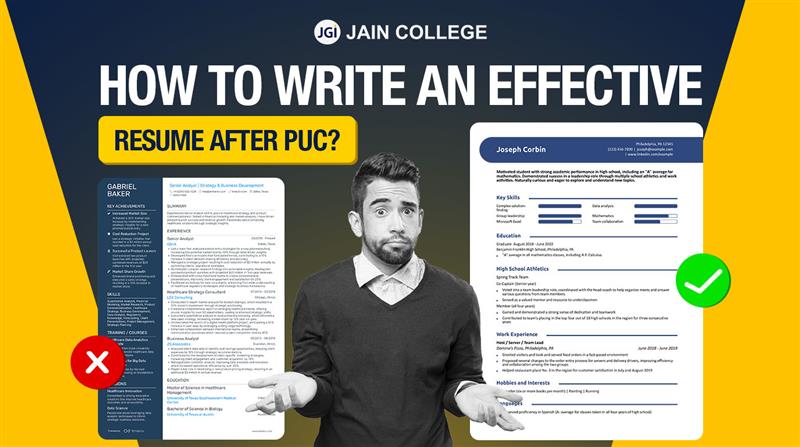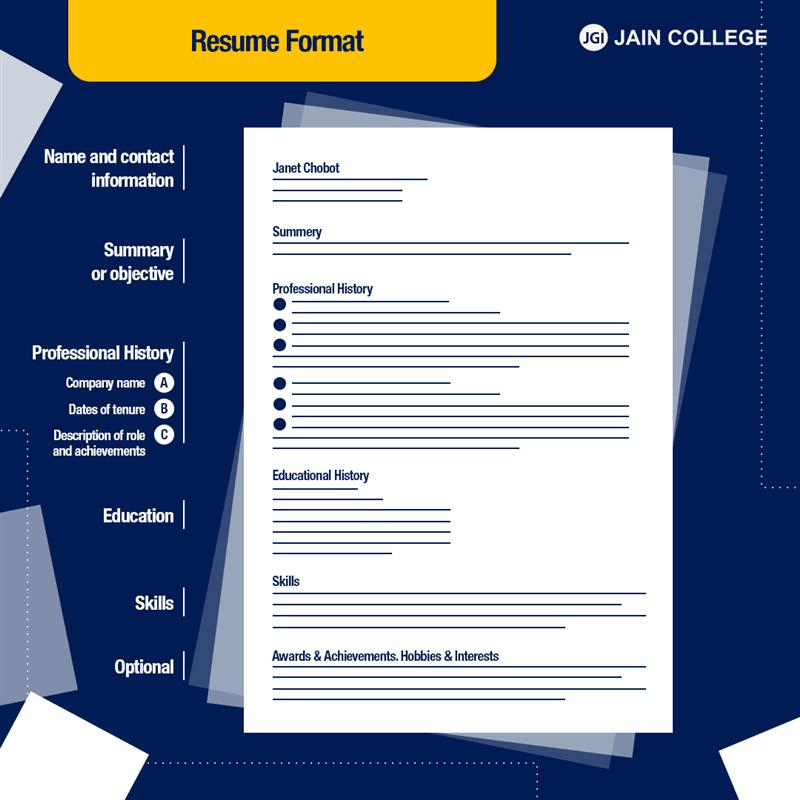
Building a strong resume after you complete your Pre-University Course (PUC) is essential to securing your first job or pursuing further education. As a new graduate, your resume briefly describes your skills, accomplishments, and potential, highlighting your preparedness to enter the job market.
Although you may lack extensive work experience, you can still emphasise your academic successes that involve extracurricular activities, internships, and volunteer experiences to showcase your abilities.
In this article, let us learn how to create a resume that captures the attention of recruiters and sets you on a successful path.
A formal resume summarises your skills, qualifications, work experience, education, and other relevant information. Potential employers or educational institutions use it to assess your suitability for a particular job or programme. It acts as a personal marketing tool, showcasing your strengths and achievements in a concise and organised manner.
Name, Address, email ID, contact details, DOB and more
Marks or percentage score in Class 10, 12, Degree and Masters’ if pursued
Complete details of career details
Total work experience along with the company details, job profile, and number of years served in each company or organisation
List out details about the acquired academic and professional skills
List out all the honours, awards and achievements earned both during academics and in a career field.
Adding volunteer experience in a resume is highly relevant to the job, and employers learn about your hobbies, interests, and professional experience.
These are some of the essential components that go into an effective and well-rounded resume. A resume with all the relevant components provides potential employers with a summary of candidates' credentials and reasons to consider the respective candidates for their job prospects.
A resume is significant in the professional world as it is your marketing tool. It provides potential employers, colleges, or other organisations with a snapshot of your qualifications, skills, and experiences, helping them assess your fit for a specific role or programme.
Here are some of the key reasons why a resume is so important:
A resume is often the first point of contact between you and a potential employer. It allows you to make a positive first impression by showcasing your skills, experiences, and qualifications in an organised manner. A well-crafted resume highlights your strengths and sets the tone for future interactions.
One of the primary purposes of a resume is to summarise your professional skills, educational background, and relevant work experience. It helps employers quickly identify if your expertise aligns with the job requirements. Even without extensive experience, a well-organised resume can emphasise transferable skills, internships, and academic achievements that make you a strong candidate.
In today's competitive job market, a resume is essential to highlight your best and most relevant abilities and attributes. Recruiters and hiring managers often review hundreds of resumes for a job opening. A well-written, clear, and tailored resume increases your chances of being noticed and considered for an interview.
A resume reflects your professionalism and attention to detail. Creating a structured and error-free document demonstrates your commitment to presenting yourself in the best possible way. A polished resume helps you convey your readiness for the challenges of the job.
As your career evolves, updating your resume regularly helps you track your growth and accomplishments. Whether you're applying for promotions, new jobs, or higher education programmes, having an updated resume allows you to present an accurate reflection of your skills and experiences.
One of the most significant benefits of a resume is its ability to be tailored to different job applications or educational pursuits. A customised resume highlighting specific skills or experiences that match the requirements of the role or programme you're applying for increases the likelihood of standing out to recruiters.
Beyond job applications, a resume is valuable for networking events or job fairs. Having an updated resume readily available helps you quickly share your qualifications with potential employers, mentors, or industry professionals, opening doors for future opportunities.
To conclude, a resume is a powerful document crucial to advancing your career. It provides a concise yet comprehensive overview of your qualifications, making it an essential tool in job searches, career growth, and professional networking. Creating a resume that reflects your strengths and experiences maximises your chances of securing the opportunities you're aiming for.

Writing a resume after completing your Pre-University Course (PUC) can be a key step toward securing your first job or applying for higher education. Even without significant work experience, a well-crafted resume can highlight your skills, achievements, and potential.
Here is a step-by-step guide to help you write an effective resume after PUC that makes a strong impression on recruiters and admissions officers.
At the top of your resume, include your full name, phone number, email address, and LinkedIn profile (if applicable). Ensure your email address is professional, ideally a combination of your first and last name. This makes it easy for potential employers or institutions to contact you.
An objective statement is a brief introduction summarising your career goals and what you aim to achieve in the position or programme you are applying for. Since you are just starting, ensure your objective reflects your enthusiasm for learning and contributing.
Even without work experience, you have valuable skills gained through your academic and extracurricular activities. Focus on technical skills and soft Skills. Tailor this section to the job you are applying for by emphasising skills relevant to the role or field.
Include them on your resume if you have participated in any internships, part-time jobs, or volunteer activities. Even short-term work can demonstrate responsibility, work ethic, and your ability to apply classroom learning to real-world tasks. Mention the organisation, role, dates, and key tasks you performed.
Extracurricular activities like sports, music, clubs, or leadership roles in student organisations can be great additions to your resume. These activities demonstrate qualities like teamwork, discipline, and leadership.
Include any notable achievements during your PUC, such as awards, recognitions, or competitions you participated in. This could include academic honours, certificates, or accomplishments in extracurricular activities.
Your resume should be one page long, especially as a PUC graduate with limited work experience. Use bullet points to make your resume easy to scan, and keep the content concise. Avoid unnecessary jargon and keep the language clear and professional.
Before sending your resume, double-check for spelling, grammar, or formatting errors. A polished, error-free resume reflects attention to detail and professionalism. You can also ask someone you trust to review it for feedback.
Thus, crafting an effective resume after PUC is an essential step toward your career or educational pursuits.
Even without extensive work experience, you can create a compelling resume by focusing on your education, skills, extracurricular activities, and any internships or volunteer work.
Tailor your resume to the specific job or opportunity you are applying for, and keep it concise, clear, and professional. A strong resume will enable you to progress to the advanced stages of the recruitment process.
A carefully designed resume is your initial step towards gaining access to new possibilities and progressing in your career.
Stay tuned with JAIN College to discover more about how a resume fuels innovation, problem-solving, and growth in various industries.
Your resume should include contact information, an objective statement, education details, relevant skills, internships or volunteer work, extracurricular activities, and achievements.
Your resume should ideally be one page long, especially if you are starting your career or applying for higher education.
Focus on your academic achievements, relevant skills, internships, volunteer work, and extracurricular activities. These experiences demonstrate your potential.
Yes. Extracurricular activities like sports, clubs, and leadership roles show valuable teamwork
time management, and leadership skills.
Keep the layout simple and professional. Use clear headings, bullet points, and a consistent font to ensure readability.

JAIN PU College, a part of the renowned JGI Group, is committed to empowering students with quality education.
Beyond academics, the college ensures its online content reflects the same standard of excellence. Every blog and article is meticulously vetted and proofread by subject matter experts to ensure accuracy, relevance, and clarity. From insightful educational topics to engaging discussions, JAIN PU College's content is crafted to inform, inspire, and add value to its readers, reflecting the institution's commitment to intellectual growth and innovation.
View all Blogs